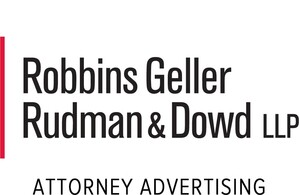SAN FRANCISCO, April 13, 2016 /PRNewswire/ -- Robbins Geller Rudman & Dowd LLP and Devine Goodman Rasco & Watts-FitzGerald LLP announce a first-of-its-kind federal class action lawsuit where two Florida retailers, acting on behalf of themselves and potentially millions of similar merchants, have sued the four largest U.S. credit card companies and some of the country's biggest banks for conspiring to shift the responsibility for billions of dollars in fraudulent credit card charges away from those financial giants and onto the merchants. Attorneys representing the proposed class have established a website where merchants can learn more about the case and potentially join the action at chipcardlitigation.com.
The lawsuit, styled B&R Supermarket, Inc., et al v. Visa, Inc., et al, Case Number 3:16-cv-01150-WHA, was filed March 8, 2016, and is proceeding before United States District Court Judge William H. Alsup in the Northern District of California.
The lawsuit centers on the changeover from old-fashioned magnetic-stripe payment cards to modern cards containing computer chips, known as EMV cards. (EMV stands for Europay, MasterCard and Visa, the companies that created the chip cards nearly twenty years ago.) In the United States, several of the payment card companies together formed a company called EMVCo, LLC, which develops the technology and sets the standards for its use. EMVCo is one of the defendants in the lawsuit. EMV chip cards are supposed to be more secure than magnetic-stripe cards because they create an individual record of every transaction. The chip cards have already been adopted for use in much of the rest of the world, but the enormous United States economy – where consumers engage in 2.6 billion card transactions worth more than $2 trillion every year – has been slow to adopt the new technology.
Several years ago, the credit card companies decreed that, as of October 1, 2015, every merchant who accepted their Visa, MasterCard, American Express and Discover cards had to be able to process the new chip cards if they wanted to ensure that they would not be liable for certain fraud charges that had never before been charged to merchants. The card networks and banks decreed they would institute what they called the "Liability Shift." Before the Liability Shift, the card issuers – as part of the so-called "fraud protection" they market to their cardholders – absorbed the costs of fraudulent or other wrongful charges. From the day of the Liability Shift, however, the card issuers made merchants who didn't accept the chip cards liable for all these costs, called "chargebacks."
The only way for a merchant to avoid such chargebacks is for the merchant to obtain specialized, costly equipment to read the card and to have that equipment – along with every connection from the consumer, to the merchant, to the merchant's card servicing company (called an acquirer), to the credit card networks, to the banks that issue the cards – "certified." But "certification" is a murky, nebulous process that is controlled by the defendants, who actually benefit from the existence of uncertified merchants who they can subject to the "Liability Shift." Even for merchants who did everything they could to be ready on time, like Milam's Markets and Grove Liquors, the certification process is lagging months – and maybe years – behind, with no relief in sight.
In just the first five months after the Liability Shift, Milam's Markets, a South Florida grocery store chain, and Grove Liquors, a Miami shop, claim they were assessed more than $10,000 in chargebacks, compared with virtually none for the same period the year before.
The lawsuit alleges that the defendants knew in advance that certification would be delayed or impossible for millions of merchants, but the defendants went ahead with the Liability Shift anyway, precisely because they would benefit by shifting the billions of dollars in chargebacks from themselves to the merchants.
"What you have is a massively unfair and intentional Catch 22, where the very people who benefit from making these merchants pay under the Liability Shift are the people who imposed it and now control when, if ever, the merchants can get out from under it," said Patrick J. Coughlin, counsel for the plaintiffs, from Robbins Geller Rudman & Dowd LLP. The plaintiffs are also represented by Florida law firm Devine Goodman Rasco & Watts-FitzGerald LLP.
The defendants named in the lawsuit are: Visa, Inc. and Visa USA, Inc.; MasterCard International Incorporated; American Express Company; Discover Financial Services; Bank of America, N.A.; Barclays Bank Delaware; Capital One Financial Corporation; Chase Bank USA, National Association; Citibank (South Dakota), N.A.; Citibank, N.A.; PNC Bank; National Association; USAA Savings Bank; U.S. Bancorp National Association; Wells Fargo Bank, N.A.; EMVCo, LLC; JCB Co. Ltd; and UnionPay. Click here for a copy of the full complaint.
Logo - http://photos.prnewswire.com/prnh/20150415/198876LOGO
SOURCE Robbins Geller Rudman & Dowd LLP
Related Links
http://www.rgrdlaw.com/?utm_source=PRNewswire&utm_medium=Press%20Release&utm_campaign=Site%20Preview
WANT YOUR COMPANY'S NEWS FEATURED ON PRNEWSWIRE.COM?
Newsrooms &
Influencers
Digital Media
Outlets
Journalists
Opted In



Share this article